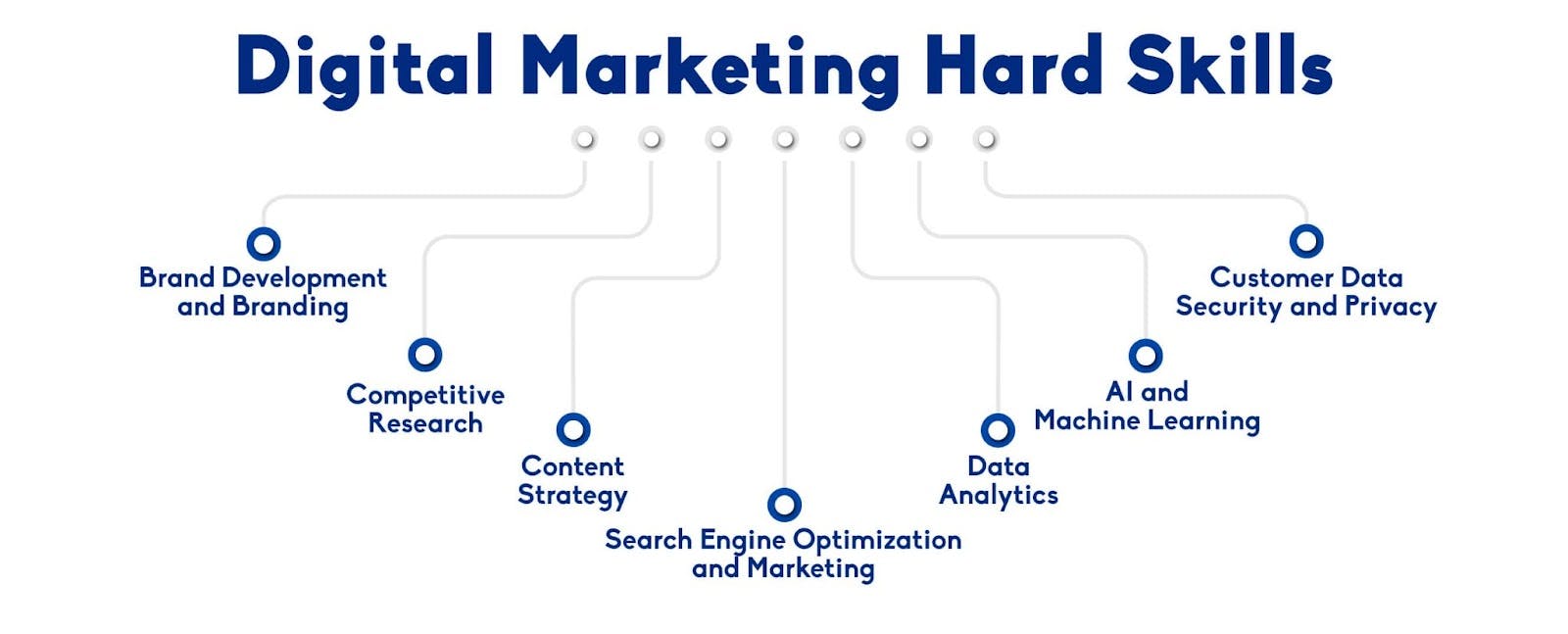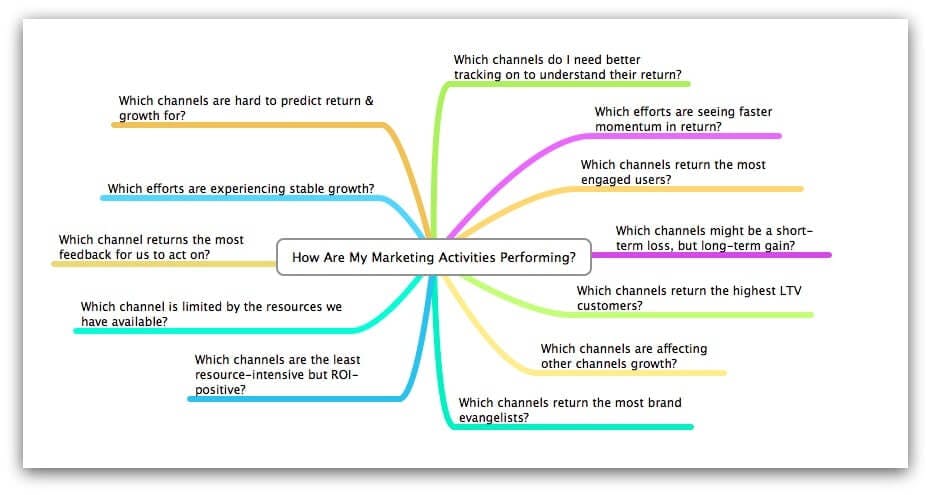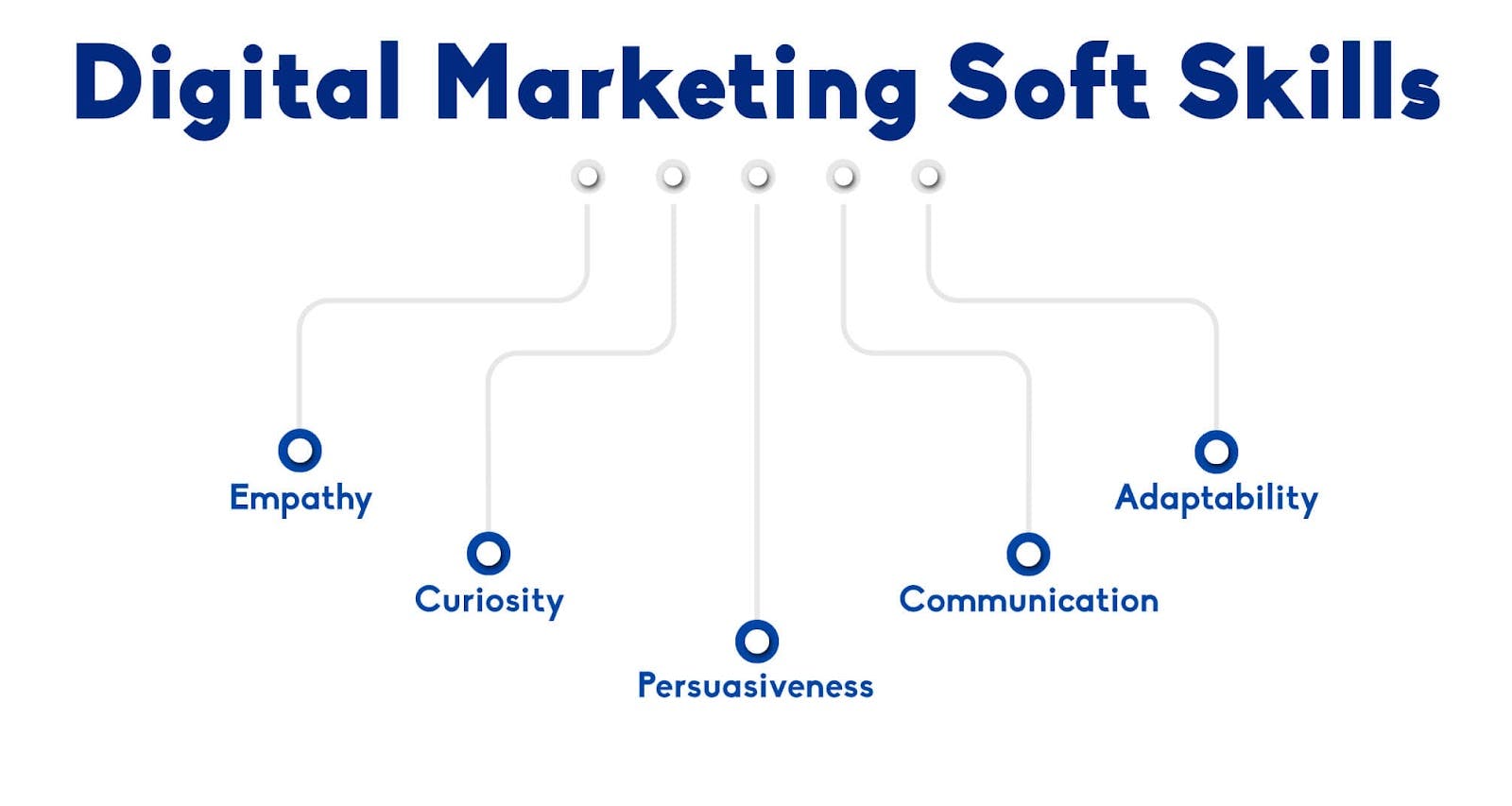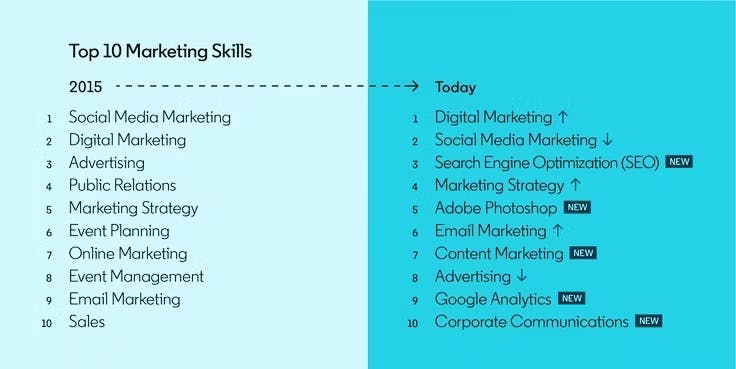11 Valuable Marketing Skills for a Successful Marketer
Jan 25th, 2024

In today's business world, marketers are the driving force behind success. They create strategies and campaigns to grab people's attention and drive growth. Behind every successful brand is a team of marketing experts with unique skills that make them stand out in a crowded market.
In this article, we’ll explore the main characteristics and skills that define successful marketers. We’ll reveal the secrets that help them stay ahead of the competition and create convincing stories that connect with consumers. These skills, whether used in digital or traditional marketing, are the foundation of effective campaigns.
Essential skills for every marketer
Let us look at 11 key marketing skills that every professional should possess to excel in the competitive marketing landscape. Practicing and refining these skills will undoubtedly improve your marketing expertise.
1. The ability to create and implement marketing campaigns
Developing and executing marketing campaigns is one of the most critical skills for any marketer. It’s not just about advertising your product or service; it implies knowing the market, who you’re trying to reach, and the competition you’re facing. You need to be able to analyze market trends and consumer behavior to create a marketing strategy that brings in customers and helps you grow in the long run.
What is more, a marketer should understand the goals of the campaign, which can be anything from raising brand awareness to generating leads. A powerful marketing strategy also includes making informed decisions about resource allocation, budgeting, and choosing the optimal marketing channels.
Another crucial aspect of developing and executing marketing campaigns is the ability to adapt. Marketing campaigns should not be set in stone. They require ongoing monitoring and adjustments based on performance metrics and real-time feedback. Marketers should be ready to pivot their strategies, messaging, and resource allocation as needed.
2. Digital marketing skills
Today, every marketer needs to be proficient in various digital marketing channels and strategies. These include SEO, SEM, email marketing, social media, including dark social, and content marketing. A viable SEO strategy is critical in today’s world, where Google processes more than 8.5 billion searches daily. If your website is optimized for search engines, you’ll likely appear at the top of Google’s search results. That means you’ll be able to attract and convert more potential customers.
Second, search engine marketing includes paid advertising via Google Ads, essential for reaching your target audience. SEM allows you to compete for the top ad placement on search engine results pages, which means you’ll see immediate outcomes. For example, a company that wants to promote a special offer for a limited time can leverage SEM to ascertain that their ads show up when users search for related keywords on SERPs, driving traffic to their website.

Third, email marketing remains an integral part of the digital marketing toolkit. It provides a direct line of communication with a segmented audience. Through email campaigns, marketers can deliver personalized content, nurture leads, and foster customer loyalty. As an example, an e-commerce business can use email marketing to inform customers about new product arrivals or exclusive offers, encouraging repeat purchases and brand loyalty.
3. Analytical skills
The other essential skill is to gather, interpret, and draw insights from marketing data and metrics to make informed decisions. With data analysis, marketers can identify patterns and trends that can guide their strategies. It involves the examination of customer behavior, sales data, social media statistics, and various key performance indicators to understand the target market better and attract the right audience.

One of the most crucial aspects of analytical skills is accurate data interpretation. This requires a combination of statistical knowledge, critical thinking skills, and business intelligence. Analytical skills also include the ability to use tools and technologies that make data collection and analysis easier. These tools include Google Analytics, social analytics platforms, and CRM software.
Marketers should also be able to communicate insights to stakeholders above just supplying the underlying data. It implies creating a story around the data, demonstrating its relevance and how it correlates with marketing strategies and business objectives. Marketers should excel at simplifying complicated information and providing clear explanations that inspire stakeholders to take action.
4. Content creation skills
Effective copywriting is a pivotal marketing skill. It’s the art of creating convincing copy for marketing products, websites, and email marketing campaigns. To be a good copywriter, you need to craft messages that resonate deeply with your target audience and inspire them to take action. To achieve this, you should have a good understanding of human psychology.
In recent years, there's been a significant change in the way we create content. Long-form writing has become more popular because it lets marketers dive into complex topics and become experts in their field. Thus, you need to conduct research and be able to create entertaining and informative blog posts, stories, and white papers. Moreover, you should use reliable sources and present complicated information engagingly and clearly.
Conversion copywriting focuses on creating compelling and action-driven content. In today’s digital world, creating copy that motivates readers to purchase or subscribe to a newsletter is essential. It’s about using unconventional techniques, like storytelling and psychological triggers. By understanding these aspects of content production, marketers can capture and hold their online audience’s attention and reach their goals.
5. Project management skills
Project management is an essential part of a marketer’s toolkit. It refers to the ability to coordinate and manage marketing efforts and projects. It’s the connection between the ideas behind marketing campaigns and their implementation on the ground. When marketing professionals use these skills, they can simplify processes, improve communication between team members, minimize potential risks, and deliver successful marketing campaigns.
Marketers often work on multiple campaigns and projects simultaneously, so they need to prioritize tasks, set realistic deadlines, and efficiently allocate their time to meet them. Project management skills ensure that projects are executed within the specified timeframes, maximizing productivity.
Furthermore, risk assessment and mitigation are vital aspects of project management in marketing. Marketers must be able to identify potential risks or obstacles that might hinder a project's success and develop strategies to address these challenges. It includes anticipating changes in the market landscape, shifts in consumer behavior, or unexpected external factors that could impact the campaign results.
6. Communication skills
Everyone needs good communication skills, regardless of their profession. However, for experts in industries like marketing, where persuasive communication is vital for success, it plays a central role. Using compelling communication techniques, marketing professionals may share their ideas, reach their target audience, and establish trust with clients.
Marketers need to be able to explain complex concepts in a way that resonates with their target market. In addition, communication is important when working within marketing teams and collaborating with stakeholders. It helps ensure that everyone is on the same page when it comes to goals and strategies.
Customer interaction and crisis management also require strong communication skills to build trust and solve problems. Convincing communication is essential when faced with a crisis, whether it’s a negative publicity or a product issue. It’s not just about coming up with the right answers but also about delivering them with poise and empathy. Responding to concerns quickly and efficiently can help alleviate the situation and protect the brand’s reputation.

7. Brand management
Brand management involves shaping and controlling how a brand is perceived by its target audience. It goes beyond just having a recognizable logo or catchy tagline. It's about creating a consistent and positive brand image that appeals to consumers. Marketers need to develop a deep understanding of the brand's values and personality and promise to ensure that all marketing efforts align with these core elements.
Successful brand management includes brand positioning, brand messaging, and brand consistency. Marketers must position the brand strategically, understanding its unique value proposition and how it differs from competitors. They are responsible for crafting compelling brand messages that convey the brand identity and connect with consumers on an emotional level.
Brand consistency is central to brand management. Marketers make sure the brand is holistically represented across all touchpoints, from advertising and marketing materials to customer interactions and product packaging. Consistency builds trust and recognition, making it easier for customers to relate to and remember the brand.
8. Sales skills
Sales skills are useful for every marketer as they enable marketing professionals to attract and engage potential customers and convert those leads into actual sales. While marketing primarily focuses on building awareness and interest in a product or service, having sales skills in your toolkit can significantly enhance the ability to drive revenue and contribute to a company's success.
First and foremost, effective communication is a core sales skill that benefits marketers. Marketing professionals need to craft compelling and persuasive messages to capture the attention of potential customers and convey the value of the products they are promoting. The ability to articulate the unique selling points, benefits, and solutions offered by a product or service is a key aspect of sales skills that can enhance a marketing campaign's effectiveness.
Furthermore, understanding the buyer's journey and the sales process is vital for marketers. Sales skills provide insight into the psychology of purchasing decisions, allowing marketers to tailor their strategies to align with the various stages of the sales funnel. Marketers with sales skills can create content and marketing campaigns that not only attract leads but also nurture them through the decision-making process, ultimately increasing the likelihood of conversion.
9. Budget management
Marketers are typically responsible for planning and executing various campaigns and strategies. Therefore, having strong budget management skills enables them to make informed decisions, control costs, and deliver results within financial constraints.
These skills involve the ability to set and prioritize marketing expenditures. Marketers must determine how to allocate their budget across different channels and campaigns, whether digital advertising, content creation, social media, or other marketing activities. This skill ensures that resources are distributed effectively to meet the company's overall marketing goals.
Budget management also includes cost tracking and financial analysis. Marketers must monitor expenses throughout a campaign or marketing period to ascertain that spending aligns with the budget. Regularly reviewing and analyzing costs helps avoid overspending and identify areas where the company can optimize resources for better results.
10. Leadership skills
Leadership skills empower professionals to guide teams, make critical decisions, and inspire others to achieve marketing objectives. Marketers often lead cross-functional teams and must set a clear vision and strategy while fostering collaboration. Moreover, marketing professionals must tackle challenges, take responsibility for campaign performance, and help team members develop their skills.
Strong leadership qualities enable marketers to create a positive and inspiring work environment that encourages their team members to think outside the box, take calculated risks, and come up with new, groundbreaking ideas. This not only boosts the team's productivity but also leads to the development of more successful marketing strategies.
Furthermore, leadership skills help build relationships within the marketing department and with stakeholders outside of it. Marketers with leadership qualities excel in establishing connections with other departments, like sales or product development, to ensure alignment, which is critical for achieving marketing goals and overall business success.
11. Adaptability
Consumers’ behavior constantly changes due to various factors, such as technology, social media, and economic trends. Marketers who can adjust to these changes will be able to tailor their marketing strategies to reach their target audience more effectively. Whether adopting new communication channels, understanding the effects of social media, or reacting to economic changes, an agile marketer should be able to adapt to the changing environment.

Moreover, the marketing industry itself undergoes constant transformation. Technological innovations introduce new platforms, tools, and channels that demand marketers' attention and expertise. Staying adaptable allows marketers to quickly grasp and capitalize on these innovations, maintaining a competitive edge. Whether it’s using AI to analyze data, optimizing content for voice searches, or taking advantage of new platforms, adaptive marketers can leverage these tools to reach their objectives.
In highly competitive marketplaces, the ability to assess and respond to market trends, competitive moves, and changing customer demands is critical. Whether it involves adjusting a product's positioning, revising pricing strategies, or utilizing a different communication strategy, adaptable marketers are likelier to thrive and outperform their less flexible counterparts.
These key marketer competencies, including strategic thinking, data analysis, adaptability, and leadership, allow marketers to create impactful campaigns, connect with audiences, and accomplish business goals. By mastering this skill set and staying attuned to industry shifts, marketers can thrive in their roles and drive growth and innovation for their organizations.
How to develop and strengthen marketing skills?
Nowadays, it’s essential for marketers to continually develop their skills and knowledge to stay competitive and successful in their roles. Thus, we will provide five approaches to developing and improving marketing skills.
Continuous learning. Constant education is a powerful way for marketers to improve their skills. To stay up-to-date with the latest trends and developments, marketers can attend workshops, webinars, and industry conferences. Online courses and certifications in various marketing disciplines, such as SEO, digital advertising, or content marketing, provide structured learning opportunities.
Mentorship and networking. Building relationships with experienced mentors in the marketing field is invaluable. Mentorship allows aspiring marketers to tap into the wisdom of those who have navigated the challenges of the industry. Whether through industry events or social media, networking enables professionals to learn from others, share experiences, and gain new insights, fostering personal and professional growth.
Practical experience. Marketers can seek internships, freelance opportunities, or side projects to apply their knowledge in real-world scenarios. Through hands-on work, they can refine their skills, learn from mistakes, and better understand what works and what doesn't in the marketing world.
Data analytics and testing. The data-driven approach is fundamental in modern marketing. By regularly monitoring and analyzing data from different channels, marketers can improve their analytical skills. Furthermore, by conducting A/B testing and analyzing performance, they can gain insight into consumer behavior and refine their marketing strategies.
Building a portfolio. For content marketing professionals, creating content is a practical way to improve skills. Creating content for a portfolio, whether it’s a blog post, a social media campaign, or a video, allows you to demonstrate your skills. Feedback from colleagues or mentors can also help you enhance your content and storytelling.
To sum up, the key to successful marketing combines education, mentorship, and practical experience. By combining these approaches, you'll be able to stay ahead of the game and make the most of your role, developing strategies that will help your business succeed and keep customers coming back.
